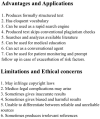ChatGPT in medicine: an overview of its applications, advantages, limitations, future prospects, and ethical considerations
- PMID: 37215063
- PMCID: PMC10192861
- DOI: 10.3389/frai.2023.1169595
ChatGPT in medicine: an overview of its applications, advantages, limitations, future prospects, and ethical considerations
Abstract
This paper presents an analysis of the advantages, limitations, ethical considerations, future prospects, and practical applications of ChatGPT and artificial intelligence (AI) in the healthcare and medical domains. ChatGPT is an advanced language model that uses deep learning techniques to produce human-like responses to natural language inputs. It is part of the family of generative pre-training transformer (GPT) models developed by OpenAI and is currently one of the largest publicly available language models. ChatGPT is capable of capturing the nuances and intricacies of human language, allowing it to generate appropriate and contextually relevant responses across a broad spectrum of prompts. The potential applications of ChatGPT in the medical field range from identifying potential research topics to assisting professionals in clinical and laboratory diagnosis. Additionally, it can be used to help medical students, doctors, nurses, and all members of the healthcare fraternity to know about updates and new developments in their respective fields. The development of virtual assistants to aid patients in managing their health is another important application of ChatGPT in medicine. Despite its potential applications, the use of ChatGPT and other AI tools in medical writing also poses ethical and legal concerns. These include possible infringement of copyright laws, medico-legal complications, and the need for transparency in AI-generated content. In conclusion, ChatGPT has several potential applications in the medical and healthcare fields. However, these applications come with several limitations and ethical considerations which are presented in detail along with future prospects in medicine and healthcare.
Keywords: AI; ChatGPT; artificial intelligence; generative pre-training transformer; healthcare; medicine; natural language processing.
Copyright © 2023 Dave, Athaluri and Singh.
Conflict of interest statement
The authors declare that the research was conducted in the absence of any commercial or financial relationships that could be construed as a potential conflict of interest.
Figures
References
-
- ChatGPT General FAQ . (n.d.). [WWW Document]. Available online at: https://help.openai.com/en/articles/6783457-chatgpt-general-faq (accessed March 6, 2023).
Publication types
LinkOut - more resources
Full Text Sources


